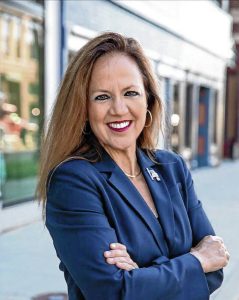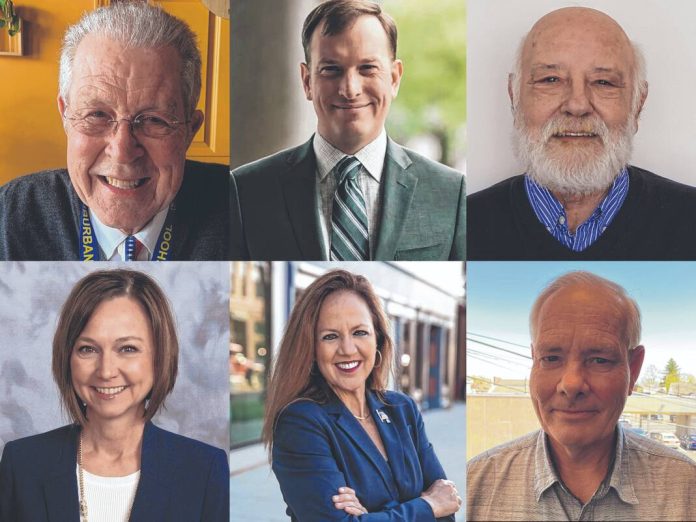Six candidates are vying for three Republican nominations in the race for Johnson County Council at-large.
Of the three currently elected officeholders, Ronald (Ron) Deer and Melinda Griesemer are seeking reelection, while John Myers is not. Current Johnson County Treasurer Michele Ann Graves is seeking the office, along with former Greenwood City Council member Ronald (Ron) Bates, Franklin veteran James Copp and Greenwood pizza shop worker Brian Moore.
The Daily Journal asked each candidate several questions for a candidate Q&A. The following is part two of the Republican candidate responses; part one can be found in Thursday’s paper and online here. A Q&A with the four Democratic candidates for county council is expected to run on Saturday.
Here are their thoughts on road work, hiring an HR employee and the new mental health building with some editing for length, clarity, grammar and repetition.
Q: With continued growth in once-rural areas and aging streets in subdivisions, county road funding is spread thin. What should the county do to catch up?
Bates: It’s essential that our county roads and bridges are held to a minimum standard and people have also made me aware of the substandard. So there needs to be some kind of minimum standard for our county roads and our bridges. Of course in some cases the county has given those bridge responsibilities back to towns and cities — that’s happened in Greenwood. Now the Greenwood municipality is responsible for the maintenance of the bridges within the city limits.
Copp: Bottom line is we need to look for all of the grants, additional money that is available whether that’s federal funds, state funds and bring those in. Even if that’s extra work on us at the county, so be it. We’re talking millions of dollars that we have passed up in the past on grants that we just didn’t take…. I don’t think there’s anybody in this county that would say that, ‘No, everything’s fine,’ with regards to our infrastructure…. So why would we pass up money? I think we need to focus on that. We can get grants, they’re available, we just need to put the effort and the hard work, sweat equity into doing it.
Deer: We have to look at those alternative sources of funding and if there are taxes where we can make a minor adjustment to it — not major increases but when you talk about going from … whatever the number is, if you raise it by one cent, you raise a lot of money. Anything that we’re going to be looking at, we have to look at it with a hard view and make sure that it’s appropriate.
Graves: There are many state grants available to assist local governments with road repairs. We should maximize our search and application for these grants in order to better utilize this type of funding for our roads and streets.
Griesemer: That’s a forever continued process — that will always be ongoing. We need to move the money from the other accounts over and pay for whatever needs to be done. The taxes were just raised, so we don’t need to raise more taxes. I don’t see the road work being the issue for the county since that was addressed last term. I see drainage problems on the roads — that needs to be addressed. This last term, we started to address this issue that we had water hanging out in the streets and due to very old drainage systems that had not been addressed by the council. We decided that we were no longer gonna kick the can down the road on the issue anymore — we’re gonna address it. Some of these pipes are over 100 years old. Others are sitting in the streets, the water sitting in the streets, and we’re gonna go ahead and take care of that. That’s what needs to be done with roads.
Moore: We have to find the funds to do it with and find the money where we’re going to get it from. We can’t raise taxes or anything else like that because the cities and towns, right now the $25 on the license plate right now, that money is split throughout the whole county.
Q: There’s an ongoing debate over increasing employee pay and hiring an HR employee. What do you think about these issues?
Bates: I was able to go to a meeting recently where the commissioners — who have the final say on this— are [thinking about] opt[ing] in the $75 million that the state has appropriated for counties for mental health purposes. And one of the questions that came up if we were to opt in on this: would we need any more employees? The head of the health department of Johnson County said we would not need any additional employees. On the other hand, I know that with growth, there also comes more responsibility. So I think that’s something that has to be looked at seriously in the future. I’m not closed, but I’m open to discussion.
Copp: My biggest concern about not having an HR employee is that we open ourselves up to a potential lawsuit because we don’t have a uniform HR policy across the county. And if somebody were to say, ‘I was treated unfairly,’ there’s no uniform policy to say yes, you were no you weren’t. And we, the county, and at the end of the day, we the taxpayer, may end up forking out large sums of money, because we didn’t take that prudent step to put somebody in place that can coalesce that together and do that. As far as wages and everything goes … we need to ensure that we have competitive wages so that we’re not spending a whole lot of money investing in training somebody, running them through the pipeline, only to have them leave for a better offer two months later.
Deer: At this point, the council is not going forward with the human resource manager, but I am appointed by the president of the council [with two other members] to look at alternatives to how we can continue to adjust benefits and/or salaries. We’ve done quite a good job in the last couple of years, 5% for 2022 and 7% in 2023, which was above the norm for most communities. We are looking at the possibility of looking at longevity pay and tiered systems. We just recently passed the allocation for the council to do that and we’re in the process of doing this with this next budget period. I firmly believe we need to keep our county employees with their experience and their knowledge and don’t want to see them leaving for other communities or private industry. The way that I have done it is to be consistent in my review and my support of increased pay.
Graves: Significant progress has been made regarding fair and competitive wages for county employees. This should help in both attracting and retaining qualified employees. As it pertains to hiring an HR employee there has been a lot of discussion lately. I think more information is needed. How the county is currently responding to HR issues; this response is effective. How would this new position add value to Johnson County government? We need more information.
Griesemer: The county is big enough to justify hiring an HR specialist.
Moore: If the cost of living is there, yeah. We have stayed competitive with our other surrounding counties and the state level. Put it this way, a police officer in Greenwood makes about $75,000 a year, roughly. The small towns are making about $55,000 to $65,000 a year. If the money is there to pay them, yeah let’s pay them. That’s basically over a two to three-year period. We get all caught up because we don’t have industrial businesses like these cities and towns do, where are we going to get the money? Are we going to tax the businesses out here in the redevelopment commission? … We need a form the whole county redevelopment commission as one not just cities and towns where they have control of the money, that way if they need money from the whole county, we can put all of that money together as one and have somebody represent all these small towns to be on this board and all of that redevelopment commission money can be put in a general fund for the whole county.
Editor’s note: A joint redevelopment commission like Moore describes would not be possible under the current Indiana law. For more information see IC 36-7-14.
Q: Last year, the county council appropriated $11 million toward a new mental health building. Was this an appropriate use of the funds?
Bates: I do because I think that’s one of the leading issues that the county needs to face. There’s many others, obviously. They’re all equally important, trying to hit everything equally and if there’s a priority that needs to be done, then it’s a priority that needs to be addressed and then move on to the next priority.
Copp: It’s an incredibly important thing. At the end of the day, that decision has been made and we’re moving with it, whether it’s a right decision or wrong. I think it’s a prudent decision in the long run because as we get a larger population here in Johnson County … if we can find a place to just get them through that first portion of that, and then look for some long-term care where they’re not laying out here on the street, that’s a prudent use of our funds. It’s only going to become a greater concern as the county grows so we need to stay ahead of it.
Griesemer: Absolutely. I voted for it. It was appropriate because it benefits everyone. Mental health affects the rich and the poor alike. It affects absolutely everyone and benefits everyone. My promise [is] to be the voice of the people and this is what they wanted. I have no regrets. In fact, I will push for more money toward it. I want to see Johnson County be a premier place to go for the latest research in the state.
Deer: It certainly was. Not only the building, but the staffing of that is going to be something that we’re going to have to make sure we have and the hospital is going to do some of that. Somewhere along the line, there potentially may be additional requests for funding from the county.
Graves: The money that we spent toward improving Johnson County’s ability to respond to mental health issues was funded by ARPA [American Rescue Plan] money. That money was awarded to the county by officials in Washington and had no impact on property taxes. So, this money came with specific regulations on how it could be derived. I think this was money well spent toward improving our county’s ability to respond to mental health issues.
Moore: That’s already been done, there’s nothing we can do about it. The building has already started … it should have been put on a referendum by the taxpayers, let them vote on it say ‘Hey, this is what we want, this is what we don’t want.’ If we need a mental health hospital, I say yeah. If these people have mental health problems. There’s also federal and state dollars on that too.

The Bates File
Name: Ronald (Ron) Bates
Age: 76
Residence: Greenwood
Family: Wife, Donna; four children
Occupation: Educator at Suburban Christian School
Education: Charles G. Ross High School, Missouri; Tennesee Temple University bachelor’s; Tri-City Bible College master’s; Maranatha Baptist University, history graduate certificate
Political Experience: Served two terms on city council in an Illinois city; Greenwood City Council member from 2004-2023
Memberships: Johnson County Republican Women’s Club, Suburban Baptist Church

The Copp File
Name: James Copp
Age: 43
Residence: Franklin
Family: Wife, Sara; three children
Occupation: Patriot Products, director of business development
Education: Center Grove High School, 1999; Ball State University, 2003
Political experience: First-time candidate
Memberships: Elks Club, Center Grove Rotary, Bargersville Rotary, Knights of Columbus, Civil Air Patrol
Military Experience: 21 years Active Duty, 3 years in Army National Guard

The Deer File
Name: Ronald (Ron) Deer
Age: 74
Residence: Greenwood
Family: Adult daughter
Occupation: Retired, management
Education: George Washington High School, IUPUI, 1971
Political experience: Greenwood City Council, 1987 to 2011; Johnson County Council member since 2020
Memberships: Southland Community Church
Military experience: None

The Graves File
Name: Michele Ann Graves
Age: 61
Residence: Trafalgar
Family: Husband, Mark; two children
Occupation: Johnson County Treasurer
Education: Indian Creek High School, 1981
Political experience: Johnson County Treasurer since 2016
Memberships: Johnson County Republican Women’s Club, Johnson County Republican Central Committee, Johnson County Board of Finance
Military Experience: None

The Griesemer File
Name: Melinda Griesemer
Age: 52
Residence: Greenwood
Family: Adult daughter
Occupation: Owner/director of Indianapolis Medical Consulting
Education: Purdue University
Political experience: Johnson County Council member since 2020; unsuccessfully ran in 2019 caucus for Indiana House District 93; Unsuccessfully ran for Indiana House District 57 in 2022
Memberships: National Rifle Association, Mary Bryan Chapter of Daughters of the American Revolution
Military Experience: None

The Moore File
Name: Brian Moore
Age: 60
Residence: Greenwood
Family: Wife, Penny
Occupation: Crew Member at Luca Pizza
Education: Whiteland Community High School, 1983
Political experience: Unsuccessfully ran for Johnson County Council and Greenwood City Council
Memberships: Vineyard Church of South Indy
Military service: None
ABOUT THE JOB
Johnson County Council At-Large
Represents: Johnson County as a whole
Duties: Approving the county budget, including how many sheriff’s deputies will patrol the roads and how much should be spent on road projects. Approves any new or increased taxes.
Term: Four years
Pay: $11,978 a year (2024)





